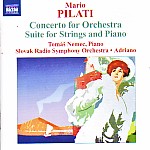Mario Pilati (1903-1938) was a minor figure in modern Italian music, but an attractive one nonetheless. All of this music was written between 1925 and 1938, the year of the composer’s untimely death. His style might best be described as “neo-classical verismo” in that the forms are the ones we have come to expect from the neo-classical movement (minuet, saraband, rondo, etc.), but the idiom comes straight from the school of Puccini and Mascagni. There’s also a healthy dose of folk music in the Concerto for Orchestra’s concluding Rondò alla tirolese, or in the Habanera from the Three Pieces for Orchestra. In short, the music is tuneful, charming, very much of its period, and extremely enjoyable in its unpretentious way. The performances are also expert: Pilati doesn’t put too much strain on his interpreters, but Adriano, pianist Tomás Nemec, and the Slovak Radio Symphony don’t take Pilati for granted and give him the kind of advocacy he both needs and deserves. The sonics are equally pleasing. This is a welcome novelty that I can see many collectors of offbeat repertoire adding to their collections. [10/20/2008]
































